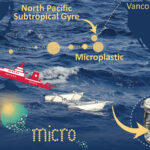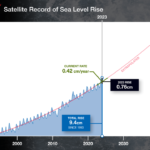The first Earth Day happened in 1970. Today is the 54th and the planet is in worse shape than when we started paying attention to the environment through this annual ritual. I remember shutting lights in our home and turning off the television for an Earth hour that first day. I continued to do this for many years hoping that others were doing the same and that we would read about a dip in electricity demand in the papers the next day. But after the first year, fewer people were paying attention.
Today on Earth Day the newspapers have headlines about plastic in the air we breathe. My wife and I recycle religiously – paper, metal, plastic, anything marked recyclable. Our building has a garbage chute that streams recyclables, organic waste and garbage. When we walk through the neighbourhood, homes have green and blue bins out on recycling and garbage days. Much of what is streamed is contaminated by stuff that shouldn’t be in the recycling and organic waste bins. Municipal governments publish materials to educate the public and in our walks, you can see that the effort by many is there. But the result so far is poor.
The Bulletin of the Atomic Scientists responsible for The Doomsday Clock isn’t writing about a pending nuclear holocaust today. Instead, its State of the Earth message is about plastic and the environmental disaster unfolding before our eyes, in the air we breathe, the water we drink, and the food we ingest.
The Bulletin notes the following:
“The plastics industry is expected to double or triple production by 2050 unless global leaders intervene. Even if the rate of plastic production holds steady, the emissions from the plastic sector could account for a fifth of the remaining carbon budget by mid-century.”
The Bulletin isn’t pulling numbers out of a hat. The analysis of plastic and its growing impact comes from a study done at the Lawrence Berkeley National Laboratory in California.
Plastic is a manifestation of our fossil fuel addiction. We create it from cracking oil and turn it into packaging from water bottles to beverage containers, clam shells and wrapping materials. The greenhouse gas (GHG) impact of producing all this plastic is enormous. Plastic’s role in the planetary climate change crisis, biodiversity loss and growing pollution is largely underappreciated.
In the Executive summary of the Lawrence Berkeley study it states:
“Proposed efforts to reduce plastic pollution do not yet include any explicit consideration of climate impacts.”
Yet we know that more plastic means more GHGs, the principal cause of atmospheric temperature rise.
The report has been published on the eve of an upcoming meeting of the United Nations’ 4th Intergovernmental Negotiating Committee (INC4) for a global plastics treaty. It starts next week in Canada’s capital, Ottawa.
This report is science-based, technically neutral, and provides information to those attending the meeting to help them formulate a global plastic treaty. It notes the following:
- The plastic industry is experiencing exponential growth with expectations that it will double or triple by 2050.
- In 2019:
- The manufacture of plastic generated 2.24 Gigatons of pollution, equivalent to the total output of 600 coal-fired thermal power plants.
- Plastic production accounted for 5% of all global carbon emissions.
- Plastic production consumed 12% of all the oil and 8.5% of all the natural gas from sources
- Exponential growth from double to triple the amount produced in 2019 means plastic production by 2050 will generate 6.78 Gigatons of pollution or the equivalent of GHG emissions from 1,700 coal-burning thermal power plants.
Describing plastic as a wrecking ball for the planet, therefore, is no understatement.
















